MyCar: a small team's big idea
Updated: 2010-06-24 07:30
By Emma Dai(HK Edition)
|
|||||||
|
Above: The prototype of MyCar developed by Hong Kong Polytechnic University. Below: A man test-drives MyCar, which was certified in the European market in 2009. provided to china daily |

Potentially big overseas markets beckon the 'mycro' MyCar, created here in Hong Kong through a fusion of big ideas and small budgets. This all-electric car's history is the window to its future. Emma Dai reports.
It's too tiny to be called a real conference room. An iron file cabinet stands on one side, a white board hangs on another. There's only enough room for four chairs and a small table. "It started right at this table," said Andrew Young, as he spoke about the MyCar project. Young, head of the Partnership Development Office of Hong Kong Polytechnic University (PolyU) initiated the MyCar project years ago, to develop Hong Kong's first home-made electric automobile.
When it was unveiled at the London Motor Show in July 2008, MyCar was voted Electric Car of the Year at the prestigious Green Fleet awards. MyCar received European certification in 2009 and now can be found in eight or more European countries. It's the pride of the SAR.
Professor Tak Lee from the University's School of Design came up with the idea to develop Hong Kong's very own car back in 2001. "Immediately I said 'No'. Nobody in Hong Kong had ever made a car. It would take so many resources and research. Besides, we don't even have a proper engine," he said.
The idea kept playing on Young's mind. That night, he says he heard an "inner voice," that told him, "I'm a car fan and I'm from the engineering field. Maybe we can make it."
Designing a full-size car would have been too much of an undertaking for a university. The costs would have been immense. But a micro car would be much simpler and eight to ten times cheaper. Micro cars were just becoming popular in Europe. "It's a niche market," Young said. "Mainstream companies didn't focus on that. We saw the market opportunity."
The consumer base was pretty small. Only people too young for a driver's license or who had had their licenses revoked would likely be interested in purchasing a micro car.
"We wanted to make a difference," Young said. "Our car should be smart and sexy enough to attract young Europeans. Other than developing an engine by ourselves, we planned to design our own chassis and match it with a ready-to-use engine."
The planners were prepared for a tough grind but the reality proved even more difficult.
Two years slipped away before MyCar had the right partner. "We connected 10-odd companies, Hong Kong and mainland based," Young said. "There were several times we nearly made the deal, but people thought it was too bold to take such risks. They either had no auto background or lack of international experience. (Cars) made in China were not that welcome and Europe's economy wasn't in a good mood in the early 2000s."
Finally Peter Sun and Raymond Chan showed up. "They are classic industrialists," Young said. "They believe in industrial development and innovation. Coming from a traditional manufacturing background, they produced car components and have a passion for automobiles." The two shareholders and PolyU established EU Auto and began the joint project officially in 2003.
That was the same year SARS struck. Hong Kong hit the top of the list for the world's most dangerous places. Just as members were about to meet their Italian co-designer, word came that the team's entrance application to travel to Italy had been rejected. "Everything had to be done through email and video conference," Young said. "But sometimes you really need to work on the same table."
Six months behind schedule, they finally caught up and finished the design. The European Union, by then, had changed its emission standard. The mainland gasoline engine the designers intended to use in the new car failed to meet the EU's new standard. "We were not sure how strict the new limits would be," Young said. "This was a big setback."
Luckily, there was a plan B.
Previous market surveys showed that all micro cars in Europe were diesel-powered. That led to heavy pollution. The designers decided to go green and replace the original gasoline engine with an electric one. With support from the two shareholders, the team began to focus on building an electric vehicle in 2005.
No sooner was the problem resolved than the designers were confronted with the problem of finding the right battery. There were three available choices, lead-acid, a nickel-metal hybrid and lithium. Balancing concerns of affordability, stability and availability proved difficult. "There were not a lot of battery suppliers five years ago," Young said. "Some cost as much as the rest of the car."
The worse thing is every battery needs its unique power-management system. So the team had to modify the design from time to time. "We tried at least six sets of electric systems," Young said. "Finally we adopted the lead-acid battery. It's inexpensive and stable."
Certification proved another stumbling block in preparing MyCar for market. The European Union required that every component be tested separately and then the car as a whole would be tested.
"If you came to me two years earlier, I would say we were in lots of trouble," Young said. "Europeans were very demanding in safety, especially when it was made in China." They spent two years to certify everything. Some mainland parts, such as the braking and suspension system, failed continuously. "We had to replace these with imported goods."
Young and his team finally achieved success in 2009, when MyCar earned entry into the European market. In May, the MyCar team announced it hoped to penetrate the US Market. There already are 10,000 orders for MyCar in the States.
"We've got a happy headache," said Zevia Tong, senior marketing manager of EU Auto. "Our Dongguan factory's productivity has to meet such a big demand. Currently all products are exported to Europe. We are thinking about expanding the mainland factory."
Innovative budgeting
MyCar already has made its name in the SAR. The question is what is the potential for the vehicle?
"This is definitely a good model for innovation," Young said. "The university and the industry conducted the project together. When they had problems they turned to us and we found the right professor to solve it. It's interaction."
"We operated efficiently," Young said. "The company has its own team and hires a lot of our graduates. So everybody knows each other and that promises smooth cooperation."
Usually, to develop a car would cost $20 to 30 million. EU Auto invested roughly $10 million and there was nothing beyond that other than $2 million funding from the Innovation and Technology Commission. "Our budget was tight," Young said. "However, we covered not only the technical but also the marketing side, both of which could be expensive."
"It's very important to bear market sense in mind," said Young.
MyCar was set as a high-end product. To guarantee the quality as well as to simplify the certification procedure, the development team chose European products as critical components. The transmission system, braking system and motor all are imported. That also shortened the innovation period and saved development costs.
To show the taste and label MyCar as "well-designed", its final look was created by Italian designer Giorgetto Giugiaro, who enjoys a wide reputation on the continent. "Mr Giugiaro's European designs are very eye-catching," Tong said. "His endorsement really helps a lot."
Apart from lower development costs for developing a micro-car the team also was able to benefit from being first in its field. "We are pioneering in the field," Tong said. "So whenever a successor comes, media would track back to us. That contributes greatly to our media exposure. PolyU and other Hong Kong organizations such as the Science Park and CLP also provided us a lot of free rides because we are the first."
Even dealers are being helpful. Local distributors took MyCar to London and Monaco car shows unconditionally.
In the process of earning a strong reputation, MyCar didn't get a penny from PolyU. "The university's role is to be the brain," Young said. "We are glad to put what we created into use. It's our mission to train human capital, lead the trend and create jobs for society."
Taking MyCar as an example, Young said, "Hong Kong is the ideal place to merge technology and market." Gathering five high-ranking research-oriented universities and many world-class minds, the SAR owns unique advantages, probably excellent business talent as well. "We know the market pulse," he said. "When we think we think worldwide."
"An innovative economy can be Hong Kong's most promising future," Young said. "Unlike real estate, innovation creates job opportunities, stimulates the economy and adds value to the city. We can match resources from the mainland to the world's intelligence to bring Hong Kong-developed products to the global market."
The administration also realizes the importance of innovation. Janet Wong, the commissioner for Innovation and Technology, said early this month, "The government will encourage local universities to boost their efforts in technology transfer and to instill in project researchers the importance of commercialization. We will continue to provide the best soft and hard infrastructure to make our city an innovation and technology hub."
"The Hong Kong government is supportive, but not enough," Young said. "Look at Singapore, Taiwan, South Korea and Japan - our competitors in the region. Their research and development expenditure as a percentage of GDP is between 2 and 3 percent. Ours is about 1.7 percent. We need much more support, double or triple maybe."
Early this year, EU Auto was acquired by GreenTech Automotive, a US-based eco-car company. To explore the American market and meet the giant needs, the company plans to build a plant in Mississippi and move the development team to the States. The new lithium battery operated MyCar is coming soon. Higher speed and longer range are in prospect.
"MyCar is a successful case," Young said. "Though it's not easy to undertake and there are not yet many successful cases in Hong Kong. It's now out of our hands. But we are excited to see the trend and we hope it can inspire others to think alike."
(HK Edition 06/24/2010 page2)
